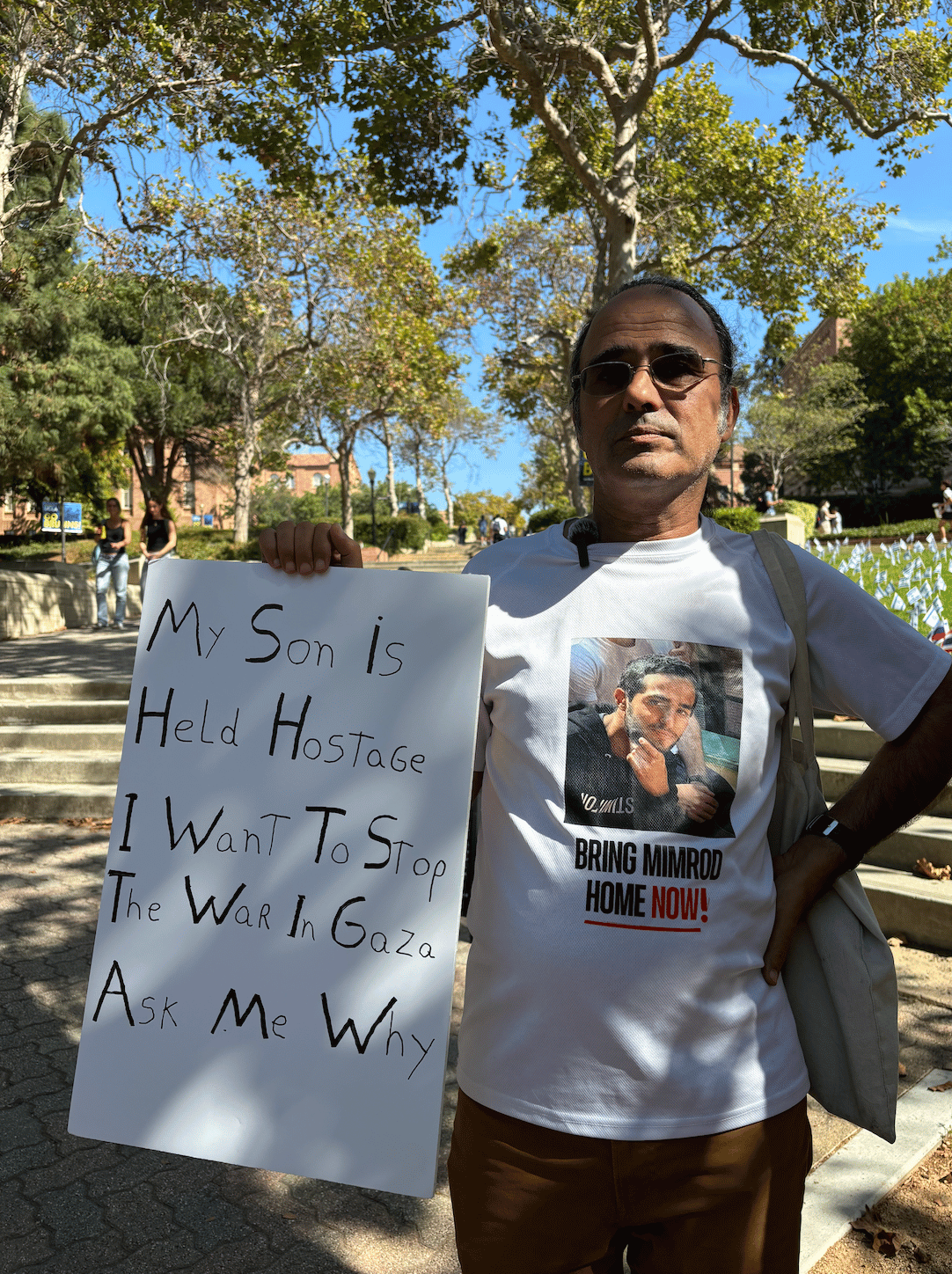On October 7, 2024, the anniversary of his son’s kidnapping, Yehuda Cohen wasn’t laying low or grieving in silence. Instead, he was speaking to Americans, urging them to push for a ceasefire. He says that this is the only way for his family to cope.
“First, we were in shock. But now we know—the only way for us to cope, the only way to strengthen my son—is to fight.
“Through the media, we know that Hamas is showing them what’s happening. Him knowing that I, his mother, and his brother and sister are fighting for him has given him the strength to hang on until we can rescue him.”
“For us, there’s no other option. The only way to cope is to fight. The alternative is to sit at home and break down.”
Yehuda Cohen is the father of Nimrod Cohen, a 19-year-old soldier who was kidnapped into Gaza on October 7, exactly one year ago from the day of this interview. The family first realized something terrible had happened to Nimrod when they saw a viral video of a burned tank and recognized it as Nimrod’s.
Nimrod’s family describes him as someone who has a zest for simple pleasures, an inquisitive spirit, and beloved by many. Above all, they regard him as a typical 19-year-old, and they see themselves as a normal family whose world was turned upside down a year ago.
During his captivity in Gaza, Nimrod turned 20, and in May, his family received confirmation that he was still alive. Yehuda Cohen told the Jewish News Syndicate: “I know he is holding on; he is young and strong. I know my son. But he is very precious to Hamas—they need him for trading purposes, so they’ll keep him.”
Yehuda stridently maintains that the only hope for his son, and for Bnei Yisrael, is a ceasefire.
“We know after months of fighting that the only way to end this, the only way to bring back all the hostages—who are dying—is through a hostage deal.”
“This is the fastest and safest way to rescue everyone, along with a ceasefire, which is needed for both sides, not just the Palestinians. We need a ceasefire. This war is going nowhere; it’s only getting worse. It’s becoming open season on Israel, with missiles coming from Iran, Hezbollah in Lebanon, the Houthis in Yemen, and Shiite militias in Iraq. A ceasefire is the only way to stop this.”
“After that, we can move to political negotiations with our neighboring countries and work toward a solution—one that promotes a two-state solution for the Palestinians and dismantles all the terrorist organizations, all the proxies of Iran. This is the only way to bring peace and security to the region.”
Although Yehuda’s plea for peace and his enduring love as a father are at the heart of his message, it hasn’t always been met with sympathy. As he carried a sign reading “My Son Is Held Hostage I Want To Stop The War In Gaza Ask Me Why” two middle-aged individuals wearing pro-Palestinian attire approached him. They began by shouting, “End the war, end the killing.”
Yehuda’s friend and fellow advocate, Luke, sincerely responded, “That is exactly what he wants—a two-state solution.” The pair quickly shifted their rhetoric, replying, “There is no two-state solution, that’s a saying from 40 years ago. Dismantle the colonization. This is my solution. There are not two nations, there is one nation—Palestine.”
As Yehuda navigated the interaction with the agitators, it became clear that he had encountered this situation before. He told them, “You are not for peace, you are not for stopping this current war,” and wished them well before they walked away.
After the encounter, Luke reflected on the exchange, saying, “As long as you ignore the other or try to push them out, you’ll never get a solution. The solution has to work for both sides—for both to have the opportunity to live safely in their countries.”
Luke later explained that they had grown accustomed to such interactions. “We’re trying to push back against the ethnonationalism on both sides,” he said, noting they had faced similar hostility from “MAGA Trumpers” albeit of a more Hawkish flavor. The group shouted insults at Yehuda “at a hostage event, by the way,” he noted.
“We’re trying to change the narrative, even within the Jewish community, to support what the hostage families want—a deal and a ceasefire. The reality is Israel is being attacked on all fronts right now, and wars always end with political negotiations,” Luke continued.
“And the reality is this: Hamas is an ideology. It’s a terrorist group… We can’t just destroy ideas.”
Yehuda agreed, stating, “After months of fighting, we know that the only way to end this, the only way to bring back all the hostages—who are dying—is through a hostage deal.”
He later emphasized that American Jews have a crucial role to play and that he had a purpose in sharing his story on UCLA’s campus. “Spread the word. We want a ceasefire. We’re not like others, like Netanyahu, who want to keep fighting. We want to end this, and the only way is through a hostage deal and a ceasefire.”
Indeed, Yehuda’s message was well-received on UCLA’s campus. Many students stopped to ask the “why” on his poster, and engaged in conversation.
One such student said, “We’re davening (praying) for him three times a day for a safe return as soon as possible. All we want is for everyone to be home and with their loved ones. That’s what’s most important here. That’s literally the only thing that matters, and all the personal politics is put aside for that.”
Yehuda’s message should serve as a stark reminder of the stakes of this war. While many would prefer to see Nimrod as a bargaining chip or a pawn in a geopolitical, religious, and ideological struggle, Yehuda must see him as a son.
Image taken by Bella Brannon

